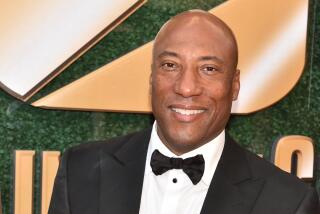IHeartMedia, largest U.S. radio station operator, files for bankruptcy to cut huge debt load

IHeartMedia Inc., the biggest U.S. radio-station owner, filed for bankruptcy with a plan to halve its debt load of more than $20 billion — the legacy of a leveraged buyout that hobbled the company as the digital era spawned new rivals.
IHeart, with about 850 radio stations and 17,000 employees worldwide, filed for Chapter 11 protection Wednesday in Houston, a move that allows iHeart to keep operating while it tries to cement its turnaround plan. The deal still needs approval from the court and some holdout creditors, and the company could hear again from John Malone’s Liberty Media LLC, which has said it wants a stake in the reorganized media giant.
“Achieving a capital structure that finally matches our impressive operating business will further enhance iHeartMedia’s position as America’s #1 audio company,” Chief Executive Robert Pittman said in a statement.
After trying to ink a deal with creditors since last March, the company said it reached an accord with investors holding more than $10 billion of its debt, along with its private equity owners, Bain Capital and Thomas H. Lee Partners. Their leveraged buyout in 2008 was the reason for much of iHeart’s borrowing, and the company hasn’t posted an annual net profit for a decade. While cash has run short, iHeart said there’s enough on hand, along with what it can earn from operations, to keep the business going, cutting the need for expensive new bankruptcy loans.
The company owns more than half a dozen Los Angeles radio stations, according to its website. They include top-40 powerhouse KIIS-FM (102.7), soft rock outlet KOST-FM (103.5) and talk radio stalwart KFI-AM (640).
The company came to terms with its senior lenders just hours before filing for bankruptcy, company treasurer Brian Coleman said in court papers filed Thursday. But one holdout group, owed $190 million, has refused to join the deal and probably will fight the restructuring, Coleman said.
IHeart’s Clear Channel Outdoor Holdings Inc. unit, which is 90% owned by the bankrupt company, wasn’t included in the filing. The deal hands control to iHeart’s senior creditors.
Among creditors is Malone’s Liberty Media, which controls satellite radio giant SiriusXM. Liberty Media accumulated a position in iHeart’s debt in recent months with an eye on gaining a stake in the radio business. Liberty sought to break the logjam in negotiations late in February by offering new capital and loans in return for a 40% stake, and has said it’s willing to go higher. JCDecaux SA, the world’s biggest outdoor-advertising agency, also has expressed interest in buying some of Clear Channel’s assets.
While Liberty isn’t mentioned directly in the restructuring documents, the agreement leaves room for potential bids by third parties and analysts have said iHeart holders probably haven’t heard the last of Liberty’s offer.
Speaking on a March 1 earnings call, Liberty Chief Executive Officer Greg Maffei cited “substantial synergies” between the ailing iHeart and two other Malone investments: the majority-owned satellite radio giant SiriusXM Holdings Inc. and Pandora Media Inc., the online music company where Liberty took a minority position last year. IHeart has its own streaming service. IHeart and Pandora, meanwhile, could share advertising technology and sales forces, Maffei said. IHeart’s is larger than those at Pandora and Sirius, he said.
About 265 million people in the U.S. still tune in to iHeart’s stations at least once a month, but newer media such as Spotify’s streaming service and SiriusXM’s satellite broadcasts have cut into the audience and put a damper on sales. IHeart countered with its own streaming services and a live-events business offering concerts and awards shows. The heavy debt was a drag on those efforts, draining $1.4 billion a year in interest payments, according to Coleman.
IHeart’s traditional businesses — the radio stations and the Clear Channel Outdoor billboard unit — still contribute the bulk of its revenue. Its $20 billion in debt makes it the largest bankruptcy in the last year, and around the 30th largest ever.
The reorganization calls for holders of the company’s term loan and other debt to get new debt, equity or warrants in a new company. Bain Capital and Thomas H. Lee Partners, as equity owners, will get around 1% of the new common stock, according to regulatory filings. After bankruptcy, its capital structure will include $5.7 billion in new secured debt and a new asset-backed loan.
The bankruptcy caps a yearlong standoff with lenders and bondholders on its latest debt-cutting plan. The deadline was extended more than 20 times as negotiators exchanged proposals and iHeart sweetened the terms. The current attempt at an accord followed at least a dozen debt revisions over the past decade.






